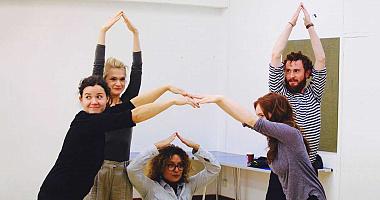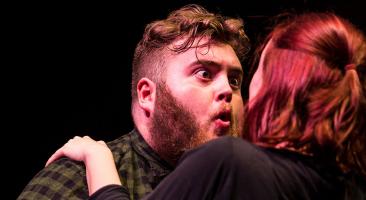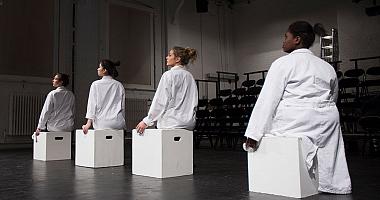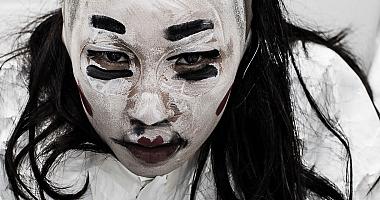MA
Dramaturgy & Writing for Performance
Content navigation menu
Why study MA Dramaturgy & Writing for Performance at Goldsmiths
A unique programme for dramaturgs and playwrights, this Masters concentrates on the process of writing for live performance, together with an ongoing evaluation of the work in process.
- This Masters will help you establish a distinctive, individual approach as a writer and dramaturg. You will work on projects including site-specific work, writing for a specific audience, verbatim theatre and interdisciplinary collaboration.
- You will develop texts for performance, and refine your intellectual understanding of the diverse forms and contexts in which live performance can be made.
- You will be taught by experienced permanent staff, as well as visiting tutors, including Goldsmiths alumni David Lane, Juliet Gilkes Romero, Penny Black, Hanna Slattne, Somebody Jones and Morgan Lloyd Malcolm.
- You will have the opportunity to work on an interdisciplinary project with students from MA Performance Making and composers from the Department of Music. Your final project texts, performed and directed by industry professionals at the Soho Theatre in London, and attended by key industry representatives.
- Graduates from this programme are highly successful in obtaining commissions, dramaturgy posts and artistic directorships. All students receive Professional Orientation and career development support. Recent successes include:
- Kendal Feaver (commissions for The Almeida Theatre and The National Theatre 2024)
- David Luff (Artistic Director Soho Theatre 2024)
- Juliet Gilkes Romero (Writer in Residence National Theatre 2023-2024)
- Somebody Jones (Tony Craze Award Winner 2023)
- You will be based in one of the world’s biggest artistic and performance hubs: London. The capital is world-leading in new writing and contemporary performance, and offers many platforms for emerging artists, as well as professional and creative networking.
- The programme has strong links to a number of London-based practitioners, international networks, and venues in the field of new performance writing (see our Key Associate Organisations). Many of these contribute directly to the teaching of the programme.
Contact the department
If you have specific questions about the degree, contact Fiona Graham.
Length
1 year full-time or 2 years part-time
Entry requirements
You should have (or expect to be awarded) an undergraduate degree of at least upper second class (2:1) standard in a relevant/related subject. You might also be considered if you have relevant experience and can show you have the ability to work at postgraduate level.
Fees
Home - full-time: £10350
Home - part-time: £5175
International - full-time: £19520
Department
What you'll study
Throughout this Masters, you will complete four compulsory modules, including a final major project in either Dramaturgy or Writing for Performance.
In addition, you'll take 30 credits of optional modules from a list approved annually by the department.
| Module title | Credits |
|---|---|
| Dramaturgy | 30 credits |
| Writing Projects | 30 credits |
| Creative Intervention in Text | 30 credits |
| Final Project: Writing for Performance | 60 credits |
| or | |
| Final Project: Writing for Performance | 60 credits |
For part-time students:
Year One
Autumn Term: Contextual option and Dramaturgy.
Spring Term: Creative Intervention in Text
(Students must normally pass all assessments taken in Year One before proceeding to Year Two).
Year Two
Autumn Term: Writing Projects
Spring/Summer Term: Final Project
Note about optional modules (if available): The above is indicative of the typical modules offered, but is not intended to be construed or relied on as a definitive list of what might be available in any given year. The module content and availability is subject to change.
Teaching
Taught sessions and lectures provide overviews of themes, which students are encouraged to complement with intensive reading for presentation and discussion with peers at seminars.
Assessment
Outcomes are assessed through all written coursework elements.
All assessed work is accompanied by some form of feedback to ensure that students’ work is on the right track. It may come in a variety of forms ranging from written comments on a marked essay to oral and written feedback on developing projects and practice as they attend workshops.
Entry requirements
You should have (or expect to be awarded) an undergraduate degree of at least upper second class standard in a relevant/related subject.
You might also be considered for some programmes if you aren’t a graduate or your degree is in an unrelated field, but have relevant experience and can show that you have the ability to work at postgraduate level.
International qualifications
We accept a wide range of international qualifications. Find out more about the qualifications we accept from around the world.
If English isn’t your first language, you will need an IELTS score (or equivalent English language qualification) of 7.0 with a 7.0 in writing and no element lower than 6.5 to study this programme. If you need assistance with your English language, we offer a range of courses that can help prepare you for postgraduate-level study.
How to apply
Apply directly to Goldsmiths using our online application system
You apply directly to Goldsmiths using our online application system.
Before submitting your application you’ll need to have:
- Details of your academic qualifications
- The email address of your referee who we can request a reference from, or alternatively a copy of your academic reference
- Copies of your educational transcripts or certificates
- A personal statement – this can either be uploaded as a Word Document or PDF, or completed online. Please see our guidance on writing a postgraduate statement
It is important that your application makes clear the nature of your commitment to work in some field of live performance; and the nature of your creative/professional interests.
Applicants to Playwriting should also include a specimen of their recent original writing for live performance – a complete play is best, even if it is a relatively short one.
Applicants to Dramaturgy should include a 1,500 word analysis of a live performance that they have seen recently.
You'll be able to save your progress at any point and return to your application by logging in using your username/email and password.
When to apply
We accept applications from October for students wanting to start the following September.
We encourage you to complete your application as early as possible, even if you haven't finished your current programme of study. It's very common to be offered a place that is conditional on you achieving a particular qualification.
Late applications will only be considered if there are spaces available.
If you're applying for funding, you may be subject to an earlier application deadline.
Selection process
Admission to many programmes is by interview, unless you live outside the UK. Occasionally, we'll make candidates an offer of a place on the basis of their application and qualifications alone.
Find out more about applying.
Fees and funding
Annual tuition fees
These are the PG fees for students starting their programme in the 2024/2025 academic year.
- Home - full-time: £10350
- Home - part-time: £5175
- International - full-time: £19520
If your fees are not listed here, please check our postgraduate fees guidance or contact the Fees Office, who can also advise you about how to pay your fees.
It’s not currently possible for international students to study part-time under a student visa. If you think you might be eligible to study part-time while being on another visa type, please contact our Admissions Team for more information.
If you are looking to pay your fees please see our guide to making a payment.
Funding opportunities
Find out more about postgraduate fees and explore funding opportunities. If you're applying for funding, you may be subject to an application deadline.
You may also be eligible to apply for AHRC funding.
Additional costs
In addition to your tuition fees, you'll be responsible for any additional costs associated with your course, such as buying stationery and paying for photocopying. You can find out more about what you need to budget for on our study costs page.
There may also be specific additional costs associated with your programme. This can include things like paying for field trips or specialist materials for your assignments. Please check the programme specification for more information.
Careers
Where your degree can take you
Numerous playwrights completing this programme receive high-level professional development opportunities, commissions, awards and full-scale productions of their work at major new writing centres in the UK, USA and in continental Europe. Many also work for at least part of the time in the fields of script development (for theatre and television), and in theatre publication.
Recent playwriting alumni include:
- Chloe Todd Fordham is a Judges Award Bruntwood Prize winner and has been shortlisted for the WiT Award and Theatre503’s Playwriting Award.
- Rhianna Ilube is a playwright and events curator from London. Her debut play, 'Samuel Takes A Break...', was Highly Commended for the Soho Theatre’s Verity Bargate Award, and shortlisted for the Women’s Prize for Playwriting.
In each of these cases the award-winning play was the writer’s Final Project from this programme.
Dramaturgy alumni work in professional literary management for mainstream and fringe building-based companies, as well as on freelance script development programmes in the UK and internationally. These include:
- Sam Pout is Literary Associate at Omnibus Theatre, dramaturging in-house shows and some co-productions. He also produces Engine Room, the monthly scratch night for artists with work in development.
- David Lane is a playwright and dramaturg whose work includes commissions for Half Moon, Theatre Royal Plymouth, Chichester Festival Theatre, Papatango, Forest Forge, Theatre West, Kilter Theatre, Shooting Fist, Blue Brook Productions/Tobacco Factory Theatres, and the Egg Theatre Royal Bath, where he was a Leverhulme Incubator Scholar in 2015.
Find out more about employability at Goldsmiths.
Skills
Playwriting specialists will become skilled in:
- The use of a range of techniques for the development and structuring of original material for live performance
- Working to a brief in diverse professional circumstances
- Evolving an individual creative vision
Dramaturgy specialists will become:
- Familiar with a diverse range of techniques for generating and developing new work
- Skilled in analysis of dramatic text and live performance
- Skilled in formulating a distinctive contribution to policy and practice in one or more fields of new writing
Who teaches on the programme?
The programme uses a core team of highly experienced agents, dramaturgs, directors and playwrights, led by the programme’s Convenor Fiona Graham, as well as a wide-ranging roster of predominantly London-based theatre professionals.
Recent contributors to the course include:
- Sarah Dickenson (freelance dramaturg)
- Hanna Slattne (freelance dramaturg)
- Penny Black (freelance dramaturg and playwright)
- David Lane (freelance dramaturg and playwright)
- Morgan Lloyd Malcolm (freelance playwright)
- Juliet Gilkes Romero (freelance playwright and dramaturg)
- Rosamunde Hutt (freelance director)
- Graeme Miller (interdisciplinary performance artist)
- Geraldine Pilgrim (site-specific performance artist)





